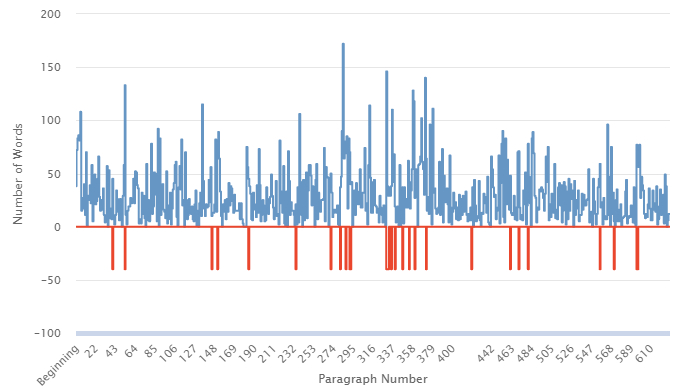I let a machine critique my novel

After letting my novel mature/fester over the Christmas break, I started the new year by putting it on a dramatic weight-loss plan. Reading the first draft in the cold light of January, there are clearly rolls of flab to be burnt away and replaced with lean, muscular prose before it’s ready to be exposed to the public. The metaphors might need toning down too.
It’s part fun, part painful. Does it really matter what that fancy hotel looks like? Nope – away it goes. Who cares about that car journey? Nobody – ditch it. Why on Earth is everyone drinking so much tea? Time to cut back.
Nit-picking with Autocrit
As a former copy editor, I like to think I have a reasonable grasp of language, but editing your own work is quite different to working on someone else’s. It’s easy to skim over your mistakes and written tics.
That’s why I decided to give Autocrit a go. Billed as “manuscript editing software for fiction writers”, it goes through your work with a red pen, highlighting potential issues with ruthless efficiency.

The software (a web app – it runs in your browser) can’t assess your story’s overall structure or tell you if your main character is an irritating wet blanket. Instead, it alerts you to issues like repeated words and phrases,
It’s by no means infallible – following all its suggestions could leave your writing sounding unnatural and, frankly, like it was written by a robot – but it can highlight some problems you’d otherwise miss. It's up to you as the author to decide if and how to act on its suggestions.
First, you’re given an overall score based on the quality of your writing. Mine was 86.64. This is a pretty arbitrary figure – the interesting part comes when you drill down to reports on pacing and momentum, word choice and readability.
Sign up for breaking news, reviews, opinion, top tech deals, and more.
These are broken down further into categories including repeated uncommon words that might stick out in the reader’s mind, repeated phrases, sentence length and dialogue tags (particularly those other than 'said' and 'asked').

The generic descriptions report helpfully pointed out that I overuse the words ‘pretty’ and ‘good’. Pretty much every paragraph – no good. However, it also slapped my wrist for overusing the bland adjective ‘nice’. With no context, it had no way of knowing I was writing about the French city Nice. Understandable.
Too much, too soon
Having thrown a chunk of my novel into Autocrit’s jaws and examining the bloodied remains, I realised it’s not yet ready for this level of savaging. You probably won't roll with all of its suggestions, but it really pushes you to examine what you've written word by word.
That's very helpful, but I'm not ready for that level of close reading yet. Only yesterday, I decided to un-kill one of my main characters. Word-by-word editing is a long way off.
The subscription fee is pretty steep (there I go again), at US$29.97 (about £20, AU$40) per month. I’ll probably come back to Autocrit once I've refined the overall shape of things a bit more.
For now, the robot editor's going back in its box, red pen and all.
- Cat Ellis has turned to technology to help write her first novel. Follow her progress in her Sculpt Fiction column.

Cat is TechRadar's Homes Editor specializing in kitchen appliances and smart home technology. She's been a tech journalist for 15 years, having worked on print magazines including PC Plus and PC Format, and is a Speciality Coffee Association (SCA) certified barista. Whether you want to invest in some smart lights or pick up a new espresso machine, she's the right person to help.